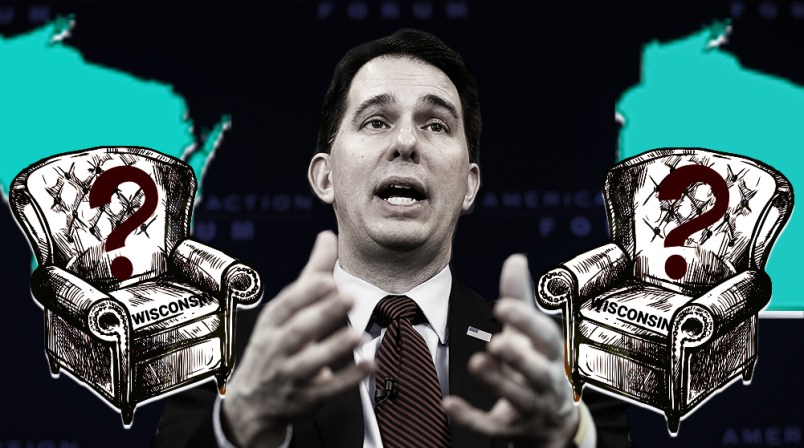In late December, two Republican lawmakers stepped down from the Wisconsin legislature to join Gov. Scott Walker’s administration.
Their seats, in Assembly District 42 and Senate District 1, have sat empty ever since — and are likely to stay that way until January of 2019.
In a remarkable break from precedent, Walker announced at the time that he would not hold special elections in those districts, leaving 229,904 Wisconsinites without representation for almost a year.
Walker’s office has said it’s not worth the cost or effort to hold the votes, since regular congressional races will take place in November. But Democrats and their allies say Walker is just scared to lose.
“This is about them not wanting to be embarrassed by losing races in districts they have traditionally won,” Wisconsin Democratic strategist Sachin Chheda told TPM. “Everybody knows it, and I think it’s embarrassing that they’d make a decision on that basis rather than the small ‘d’ democratic tenets of giving people the right to choose their own representative.”
Walker isn’t alone. Michigan Gov. Rick Snyder is likewise waiting until the November election to replace departed congressman John Conyers, forcing the Detroit district’s mostly minority residents to go 11 months without representation in Congress. In Florida, Gov. Rick Scott won’t hold any special elections for two open Florida seats. And after Democrat Doug Jones’ stunning Senate victory in December, the GOP-controlled Alabama House approved a bill that would scrap special elections for the state’s U.S. Senate seats, allowing the governor to appoint an interim replacement instead. That bill is currently before a Senate committee.
The trend comes amid a political climate that looks increasingly favorable to Democrats, thanks to President Trump’s enduring unpopularity. Democrat Patty Schactner in January trounced a well-known local Republican in a rural Wisconsin district—a win that Walker himself called a “wake up call.” And since Trump took office, Democrats have flipped some 39 seats, including two victories in Connecticut and New Hampshire this week.
In Wisconsin, Walker’s opponents see the governor’s move as the latest salvo in a sweeping assault on voting rights that began when he took office in 2011.
“There’s the [gerrymandered] maps, there’s these elections, there’s voter suppression, there’s the changing of campaign finance laws,” said Chheda.
This week, the National Redistricting Foundation (NDF), which is led by former attorney general Eric Holder, sued to require Walker to hold the special elections. The lawsuit cites a state statute that requires the governor to fill vacated seats “as promptly as possible.”
The foundation is an arm of the organization Holder created to give Democrats more control of the redistricting process in key state governments after 2020.
Per Wisconsin law, the governor must call a special election for any seat that becomes vacant “before the 2nd Tuesday in May in the year in which a regular election is held.”
Walker’s office has interpreted this to mean no election is necessary, since the two open seats were vacated in 2017 rather than the 2018 election year. And it says holding a special election would be impractical and costly.
“Voters are already going to the polls this year to elect new representatives in these districts,” Walker spokeswoman Amy Hasenberg said in a statement. “This D.C.-based special interest group wants to force Wisconsin taxpayers to waste money.”
“The Legislature will be adjourned for 2018 before these seats could be filled in special elections, and staff in these offices are working for constituents until new leaders are elected,” Hasenberg added.
But Democrats note that Walker chose to call a special election for another seat vacated in late 2017: the Senate District 10 race that Democrat Schachtner won easily in January, but which had been reliably red.
“It is evident that Gov. Walker is picking and choosing elections to his liking,” Wisconsin Senate Democratic Leader Jennifer Shilling told TPM in an email.
The governors’ opponents face an uphill battle in getting the special election on the calendar. Every week that passes strengthens the GOP’s argument that there isn’t time to organize one. And, if the NDF’s case makes its way to the state Supreme Court, it will be heard by a body that has a 5-2 conservative advantage.
But Republicans and Democrats agree that Holder’s involvement raises the visibility of the issue ahead of the midterms, where Walker himself is up for reelection.
“Having this conversation happen about the fact that Scott Walker is afraid to hold elections when he’s on the ballot in nine months is not the worst story to have out there,” said Scot Ross of the progressive group One Wisconsin Now.










